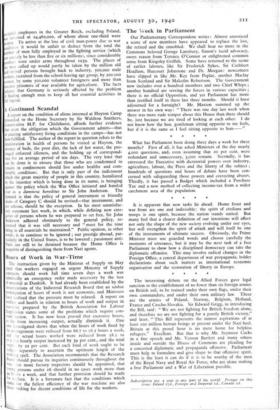flours of Work in War-Time The instruction given by the
Minister of Supply on May 22nd that workers engaged on urgent Ministry of Supply contracts should work full time seven days a week was admittedly an emergency order made necessary by the loss of material at Dunkirk. It had already been established by the investigations of the Industrial Research Board that an undue prolongation of hours of work is not economic, and Ministers have realised that the pressure must be relaxed. A report on Welfare and health in relation to hours of work and output in war-tirne prepared by the British Association for Labour Legislation states some of the problems which require con- stant review. It has now been proved that excessive hours, so far from increasing output, actually diminish it. One case investigated shows that when the hours of work fixed by the ir inagement were reduced from 66.7 to 56.5 hours a week, and 'he actual hours worked were reduced from 58.2 to 51.2 t.:e hourly output increased by 39 per cent., and the total .°11tIot, by 22 per cent. But each kind of work ought to be lodge- separately to ascertain the optimum length of the working spell. The Association recommends that the Research Board should pursue its inquiries continuously throughout the war,;fiat more factory inspectors shodld be appointed, that young persons under i6 should in no cases work more than 44 he irs a week, and that further provision should be made for v. Ifare. It is a fortunate fact that the conditions which make for the fullest efficiency of the war machine are also those making for decent conditions of life for the workers.


























 Previous page
Previous page